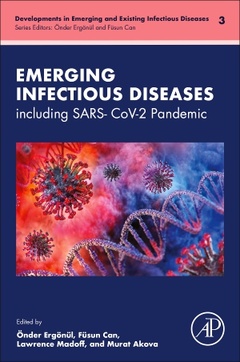Description
Emerging Infectious Diseases (2nd Ed.)
SARS- CoV-2 Pandemic
Developments in Emerging and Existing Infectious Diseases Series
Coordinators: Ergonul Onder, Can Fusun, Akova Murat, Madoff Lawrence
Language: English
Subjects for Emerging Infectious Diseases:
Publication date: 04-2024
450 p. · 15.2x22.8 cm · Paperback
450 p. · 15.2x22.8 cm · Paperback
Description
/li>Contents
/li>Readership
/li>Biography
/li>Comment
/li>
Emerging Infectious Diseases: Clinical Case Studies, Second Edition, Volume Three, is an easy-to-use, extraordinarily informative text that belongs on every clinician?s shelf. The book elegantly synthesizes the clinical, microbiologic and epidemiologic information that is critical for patient diagnosis and for use in recognizing and mitigating outbreaks. The book presents cases with discussions that fill in the gaps on critical topics. Discussions on pathogenesis provide detailed microbiological information on each infection in a ?teaching style, thus making this resource interesting for a very broad audience.
1. Introduction. what is an emerging infection? What infections are emerging?
2. Methodology of the book. According to the agents: viruses, bacteria, parasites. Infections according to the organ systems
3. Cases. Viruses. Bacteria. Fungus. Parasites. Prions
4. Emerging scientific fields developed by emerging infections
5. Dictionary
2. Methodology of the book. According to the agents: viruses, bacteria, parasites. Infections according to the organ systems
3. Cases. Viruses. Bacteria. Fungus. Parasites. Prions
4. Emerging scientific fields developed by emerging infections
5. Dictionary
academics and researchers in microbiology, immunology, infectious diseases, medical students, clinicians, laboratory scientists, infection preventionists and public health
Onder Ergonul, MD, MPH has been a professor of Infectious Diseases and Clinical Microbiology at Koç University, School of Medicine since 2011. He graduated from Hacettepe University School of Medicine in 1989 and completed his residency in 1996 in the Infectious Diseases and Clinical Microbiology department of Ankara University in Ankara, Turkey. He received his Master of Public Health degree from Harvard University School of Public Health in 2003. In 2000-2002, he worked as a research fellow in the Clinical Epidemiology division of the Infectious Diseases Department at the University of Utah, School of Medicine, USA. He is the editor of a book on Crimean-Congo Hemorrhagic Fever (2007, Springer). He received the Public Health Scientific award of Turkish Medical Association in 2007. He has been the president of the Turkish Society of Clinical Microbiology and Infectious Diseases since 2013. He has been the associate editor of Clinical Microbiology and Infection, official journal of the European Society of Clinical Microbiology and Infectious Diseases since 2013. He was elected as the member of Science Academy of Turkey in 2013.
Fusun Can is Professor of Microbiology at KOC University, School of Medicine, Rumeli Feneri Mh, Istanbul in Turkey.
Murat Akova, MD is a graduate of Istanbul University Medical School. He completed his residency training in internal medicine at Hacettepe University School of Medicine in Ankara in 1988 and in infectious diseases in 1991. Dr. Akova studied at the Department of Medical Microbiology in London Hospital Medical College, London, UK between 1988-1989 and obtained an DSc Degree in Clinical Microbiology from this institution. He was a visiting scientist at the Center for Adaptive Resistance and Microbiology in Tufts University School of Medicine, Boston, USA between 1992-1993. Currently, he serves as an attending physician in the Infectious Diseases Department at Hacettepe University School of Medicine. Dr. Akova is a member of t
Fusun Can is Professor of Microbiology at KOC University, School of Medicine, Rumeli Feneri Mh, Istanbul in Turkey.
Murat Akova, MD is a graduate of Istanbul University Medical School. He completed his residency training in internal medicine at Hacettepe University School of Medicine in Ankara in 1988 and in infectious diseases in 1991. Dr. Akova studied at the Department of Medical Microbiology in London Hospital Medical College, London, UK between 1988-1989 and obtained an DSc Degree in Clinical Microbiology from this institution. He was a visiting scientist at the Center for Adaptive Resistance and Microbiology in Tufts University School of Medicine, Boston, USA between 1992-1993. Currently, he serves as an attending physician in the Infectious Diseases Department at Hacettepe University School of Medicine. Dr. Akova is a member of t
- Includes more than 35 emerging infection cases based on newly emerging or re-emerging data
- Offers a balanced synthesis of basic and clinical sciences for each individual case, presenting clinical courses of cases in parallel with pathogenesis and detailed microbiological information
- Describes the prevalence and incidence of global issues and current therapeutic approaches
- Presents measures for infection control
- Covers recently emerging infectious diseases based on real cases, providing comprehensive information, including different aspects of the infection
- Includes discussions on Zika virus, Q-fever and influenza
© 2024 LAVOISIER S.A.S.
These books may interest you

Netter's Infectious Diseases 93.87 €



